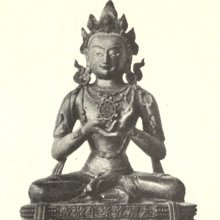Narayani, Nārāyaṇī, Nārāyaṇi: 11 definitions
Introduction:
Narayani means something in Hinduism, Sanskrit, biology, Tamil. If you want to know the exact meaning, history, etymology or English translation of this term then check out the descriptions on this page. Add your comment or reference to a book if you want to contribute to this summary article.
Images (photo gallery)
In Hinduism
Purana and Itihasa (epic history)
Source: Cologne Digital Sanskrit Dictionaries: The Purana Index1) Nārāyaṇi (नारायणि).—A Pravara.*
- * Matsya-purāṇa 196. 31.
2) Nārāyaṇī (नारायणी).—A name of Yogamāyā; Lalitā;1 the goddess enshrined at Supārśva.2

The Purana (पुराण, purāṇas) refers to Sanskrit literature preserving ancient India’s vast cultural history, including historical legends, religious ceremonies, various arts and sciences. The eighteen mahapuranas total over 400,000 shlokas (metrical couplets) and date to at least several centuries BCE.
Kavya (poetry)
Source: Wisdom Library: KathāsaritsāgaraNārāyaṇī (नारायणी) is one of the epithets of Durgā, according to the Kathāsaritsāgara, chapter 53. Accordingly, as Vīravara praised Durgā: “... thou art the principle of life in creatures; by thee this world moves. In the beginning of creation Śiva beheld thee self-produced, blazing and illuminating the world with brightness hard to behold, like ten million orbs of fiery suddenly produced infant suns rising at once, filling the whole horizon with the circle of thy arms, bearing a sword, a club, a bow, arrows and a spear. And thou wast praised by that god Śiva in the following words ... [Nārāyaṇī, etc...]”.
Also, “... when Skanda, and Vasiṣṭha, and Brahmā, and the others heard thee praised, under these [eg., Nārāyaṇī] and other titles, by Śiva well skilled in praising, they also praised thee. And by praising thee, O adorable one, immortals, Ṛṣis and men obtained, and do now obtain, boons above their desire. ”
The Kathāsaritsāgara (‘ocean of streams of story’), mentioning Nārāyaṇī, is a famous Sanskrit epic story revolving around prince Naravāhanadatta and his quest to become the emperor of the vidyādharas (celestial beings). The work is said to have been an adaptation of Guṇāḍhya’s Bṛhatkathā consisting of 100,000 verses, which in turn is part of a larger work containing 700,000 verses.

Kavya (काव्य, kavya) refers to Sanskrit poetry, a popular ancient Indian tradition of literature. There have been many Sanskrit poets over the ages, hailing from ancient India and beyond. This topic includes mahakavya, or ‘epic poetry’ and natya, or ‘dramatic poetry’.
Ayurveda (science of life)
Nighantu (Synonyms and Characteristics of Drugs and technical terms)
Source: WorldCat: Rāj nighaṇṭuNārāyaṇī (नारायणी) is another name for Śatāvarī, a medicinal plant identified with Asparagus racemosus Willed. (or “buttermilk root”) from the Asparagaceae family of flowering plants, according to verse 4.116-119 of the 13th-century Raj Nighantu or Rājanighaṇṭu. The fourth chapter (śatāhvādi-varga) of this book enumerates eighty varieties of small plants (pṛthu-kṣupa). Together with the names Nārāyaṇī and Śatāvarī, there are a total of thirty-two Sanskrit synonyms identified for this plant.

Āyurveda (आयुर्वेद, ayurveda) is a branch of Indian science dealing with medicine, herbalism, taxology, anatomy, surgery, alchemy and related topics. Traditional practice of Āyurveda in ancient India dates back to at least the first millenium BC. Literature is commonly written in Sanskrit using various poetic metres.
General definition (in Hinduism)
Source: Wisdom Library: HinduismNārāyaṇī was the mother of Śrī Vṛndāvana dāsa Ṭhākura. She lived on the island called Modadrumadvīpa (one of the nine islands of Navadvīpa). (Jaiva-dharma, Appendix)
Biology (plants and animals)
Source: Google Books: CRC World Dictionary (Regional names)Narayani in India is the name of a plant defined with Asparagus racemosus in various botanical sources. This page contains potential references in Ayurveda, modern medicine, and other folk traditions or local practices It has the synonym Asparagopsis abyssinica Kunth (among others).
Example references for further research on medicinal uses or toxicity (see latin names for full list):
· Systema Vegetabilium, ed. 15 (1829)
· Flora of the British India (1892)
· Journal of Economic and Taxonomic Botany (1996)
· Journal of Economic and Taxonomic Botany (1991)
· Tent. Fl. Abyss. (1850)
· Journal of the Linnean Society, Botany (1875)
If you are looking for specific details regarding Narayani, for example side effects, pregnancy safety, health benefits, extract dosage, chemical composition, diet and recipes, have a look at these references.

This sections includes definitions from the five kingdoms of living things: Animals, Plants, Fungi, Protists and Monera. It will include both the official binomial nomenclature (scientific names usually in Latin) as well as regional spellings and variants.
Languages of India and abroad
Sanskrit dictionary
Source: Cologne Digital Sanskrit Dictionaries: Monier-Williams Sanskrit-English Dictionary1) Nārāyaṇī (नारायणी):—[from nārāyaṇa > nāra] a f. See sub voce
2) Nārāyaṇi (नारायणि):—[from nāra] m. Name of a son of Viśvā-mitra, [Harivaṃśa]
3) Nārāyaṇī (नारायणी):—[from nāra] b f. (of ṇa q.v.) [patronymic] of Indra-senā (the wife of Mudgala), [Mahābhārata; Harivaṃśa]
4) [v.s. ...] Name of Durgā, [Harivaṃśa]
5) [v.s. ...] of Lakṣmī, [cf. Lexicographers, esp. such as amarasiṃha, halāyudha, hemacandra, etc.]
6) [v.s. ...] of Gaṅgā and Gaṇḍakī, [cf. Lexicographers, esp. such as amarasiṃha, halāyudha, hemacandra, etc.]
Source: DDSA: Paia-sadda-mahannavo; a comprehensive Prakrit Hindi dictionary (S)Nārāyaṇī (नारायणी) in the Sanskrit language is related to the Prakrit word: Ṇāyāraṇī.
[Sanskrit to German]
Sanskrit, also spelled संस्कृतम् (saṃskṛtam), is an ancient language of India commonly seen as the grandmother of the Indo-European language family (even English!). Closely allied with Prakrit and Pali, Sanskrit is more exhaustive in both grammar and terms and has the most extensive collection of literature in the world, greatly surpassing its sister-languages Greek and Latin.
Kannada-English dictionary
Source: Alar: Kannada-English corpusNārāyaṇi (ನಾರಾಯಣಿ):—
1) [noun] Nārāyaṇa, in the form of a woman, Mōhini.
2) [noun] Lakṣmi, the consort of Nārāyaṇa.
3) [noun] the essential Power of the universe, conceived in the form of Durgā.
4) [noun] the climbing asparagus Asparagus racemosus of Liliaceae family, having fleshy roots and fine fern-like leaves.
5) [noun] a musical mode, derived from the main mode Dhīra Śaṃkarābharaṇa.
Kannada is a Dravidian language (as opposed to the Indo-European language family) mainly spoken in the southwestern region of India.
Tamil dictionary
Source: DDSA: University of Madras: Tamil LexiconNārāyaṇi (நாராயணி) noun < Nārāyaṇī.
1. Durgā; துர்க்கை. (பிங்கலகண்டு) [thurkkai. (pingalagandu)]
2. Nārāyaṇī, one of catta-mātar, q. v.; சத்தமாதரிலொருத்தி. [sathamathariloruthi.]
3. Pārvatī; பார்வதி. ((சங்கத்தகராதி) தமிழ்சொல்லகராதி) [parvathi. ((sangathagarathi) thamizhsollagarathi)]
4. The Ganges; கங்கை. ((சங்கத்தகராதி) தமிழ்சொல்லகராதி) [kangai. ((sangathagarathi) thamizhsollagarathi)]
5. (Music) A secondary melody-type of the kuṟiñci class; குறிஞ்சியாழ்த் திறத்தொன்று. (பிங்கலகண்டு) [kurinchiyazhth thirathonru. (pingalagandu)]
6. Long pungent sparsi-fasciculate asparagus. See தண்ணீர்விட்டான். (தைலவருக்கச்சுருக்கம் தைல.) [thannirvittan. (thailavarukkachurukkam thaila.)]
Tamil is an ancient language of India from the Dravidian family spoken by roughly 250 million people mainly in southern India and Sri Lanka.
See also (Relevant definitions)
Starts with: Narayani prashnavali, Narayani-poovu, Narayani-puvu, Narayanikarana, Narayanimandura, Narayanipaddhati, Narayaniprashnavali, Narayanitam, Narayanivilasa, Narayaniya, Narayaniya kavya, Narayaniya stotra, Narayaniyabija, Narayaniyaka, Narayaniyam, Narayaniyatantra, Narayaniyavyakhya, Narayaniyopanishad.
Ends with: Adinarayani, Brihonarayani, Candranarayani, Cutcumanarayani, Kapinarayani, Namarayani, Natanarayani, Vatanarayani, Vishanarayani.
Full-text (+13): Namadvadashi, Naaraayani, Narayaniprashnavali, Narayanivilasa, Narani, Cakranarayanisamhita, Nayarani, Namarayani, Narayaniyopanishad, Cattamatar, Narayani prashnavali, Narayani-poovu, Narayani-puvu, Nari, Brihonarayani, Samhriti, Sthiti, Brahmayamalatantra, Narayanimandura, Irakam.
Relevant text
Search found 29 books and stories containing Narayani, Nārāyaṇī, Nārāyaṇi, Narayai, Nārāyai, Naaraayani; (plurals include: Narayanis, Nārāyaṇīs, Nārāyaṇis, Narayais, Nārāyais, Naaraayanis). You can also click to the full overview containing English textual excerpts. Below are direct links for the most relevant articles:
Chaitanya Bhagavata (by Bhumipati Dāsa)
Verse 2.323 < [Chapter 2 - The Lord’s Manifestation at the House of Śrīvāsa and the Inauguration of Saṅkīrtana]
Verse 2.18.196 < [Chapter 18 - Mahāprabhu’s Dancing as a Gopī]
Verse 3.5.757 < [Chapter 5 - The Pastimes of Nityānanda]
The Markandeya Purana (by Frederick Eden Pargiter)
Puranic encyclopaedia (by Vettam Mani)
Historical Elements in the Matsya Purana (by Chaitali Kadia)
Lineages of Aṅgirā < [Chapter 6 - Human history in the Matsya-Purāṇa]
The Markandeya Purana (Study) (by Chandamita Bhattacharya)
7. Description Devi’s Function < [Chapter 3]
Śaktism (worship of Śakti as the female goddess) < [Chapter 4]
The Skanda Purana (by G. V. Tagare)
Chapter 137 - The Greatness of Karkaṭeśvara (karkaṭa-īśvara-tīrtha) < [Section 3 - Revā-khaṇḍa]
Chapter 108 - The Greatness of Rohiṇī Tīrtha < [Section 3 - Revā-khaṇḍa]
Chapter 70 - Establishment of the Deities < [Section 2 - Uttarārdha]
Related products


